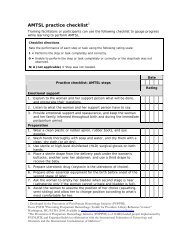Tuko Pamoja: A Guide for Peer Educators (entire - Path
Tuko Pamoja: A Guide for Peer Educators (entire - Path
Tuko Pamoja: A Guide for Peer Educators (entire - Path
You also want an ePaper? Increase the reach of your titles
YUMPU automatically turns print PDFs into web optimized ePapers that Google loves.
Who is a peer educator?<br />
A peer educator is someone who likes sharing in<strong>for</strong>mation, leading talks, and supporting their<br />
friends and agemates. A peer educator is not a teacher and is not expected to know everything. <strong>Peer</strong><br />
educators share in<strong>for</strong>mation but do not tell others what to do. They do not judge or talk badly about<br />
peers to others. <strong>Peer</strong> educators help members of their groups talk about their thoughts, feelings, and<br />
experiences, and also help them think about how they will use the new in<strong>for</strong>mation in their lives. <strong>Peer</strong><br />
educators listen to others with interest and respect.<br />
Qualities of good peer educators<br />
• Friendly<br />
• Honest<br />
• Good listeners<br />
• Respectful of others and people who are different from themselves<br />
• Com<strong>for</strong>table talking with a group and leading discussions<br />
• Do not judge others<br />
• Com<strong>for</strong>table talking about issues related to health, relationships, growing up, and sex<br />
• Want to help other people<br />
• Interested in learning and sharing in<strong>for</strong>mation<br />
• Know when to ask <strong>for</strong> help<br />
• Make good decisions and can help others to do so<br />
• Admired by peers<br />
• Supportive of others<br />
• Will not talk about group members private in<strong>for</strong>mation outside of the group<br />
Facilitation<br />
<strong>Peer</strong> educators must also be able to lead a group discussion. Below are tips to help with that.<br />
How to lead a group discussion<br />
• When a person talks, thank them <strong>for</strong> speaking. People like to feel that they have been<br />
listened to.<br />
• Do not interrupt people when they are talking. If you<br />
must stop someone who is talking too long, be sure to<br />
apologize.<br />
• Try to have as many different people talk as possible,<br />
one at a time. Encourage people to talk by saying, “Does<br />
anyone else have something to say?”<br />
• Listen carefully when people are talking.<br />
• When a person gives a very short answer to a question,<br />
you can encourage him or her to say more. You could say,<br />
“Can you tell us more about that?”

















